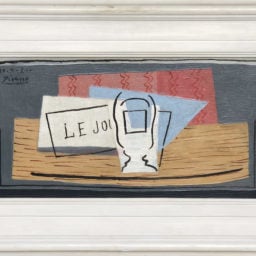A fabrication model for a giant Picasso sculpture is at the center of a lawsuit brought by a Brussels art collector against an auctioneer in Gary, Indiana.
Kraft Auction Services put up the sixteen-foot-high plywood model for sale in January, as part of its annual anniversary auction. (Kraft Auction Services—You name it, we sell it!”—also handles farm equipment and real estate, among other specialties.) The wood model, with Picasso’s approval, served as the basis for the sculpture, an abstracted, sphinx-like female figure, that was installed in Chicago’s Daley Plaza in 1967.
Jean-Christophe Scheere, who lives in Brussels, beat out four Midwestern bidders, and the hammer fell at $20,000 ($23,000 with fees). The auction house’s owner, Jonathan Kraft, told the Northwest Indiana Times that “If it had been his [Picasso’s] creation, I think it would have brought in a ton more.”
The Chicago sculpture was fabricated at Indiana’s American Bridge, the fabricator behind many of that city’s bridges, according to Northwest Indiana Times, with steel provided by Gary Works. According to the suit, the model was given to the school system nearly fifty years ago, but languished in a school gym, subject to abuse and vandalism, “with its identity and significance all but forgotten.”
The sale of the Picasso model was part of an extensive auctions of property from the school system, which was over $100 million in debt. The sales were overseen by an emergency manager’s office.
The sale of the historic model did not sit well with Gary City Councilwoman Rebecca Wyatt, chair of the council’s historic preservation committee, who called on Mayor Karen Freeman-Wilson to try to keep the model in Indiana. After consultation with the mayor, who said she was not given sufficient notice, Kraft re-opened the bidding in order to give concerned locals the opportunity to bid—six days after Scheere paid for the model, and without informing him. After getting no new bids, Kraft extended the bidding again, through March 15, again without publicizing the sale or informing Scheere, says the suit.
In the end, a bidder named in the suit as Paul Terrault, of Wisconsin, bid $40,500. In the meantime, while the auctioneers had reopened bidding, Kraft was telling Scheere in emails that there were only temporary delays in sending him his prize, involving having to run the sale by the mayor but merely as “a curtsey [sic] gesture,” because, unfortunately, “this is how Gary works.”
Only on March 14, in an email quoted at length in the suit, did the auctioneer inform Scheere that Kraft’s lawyers failed to inform the mayor of the Picasso model sale, and that only when the sale made the news did anyone raise an outcry. Apparently without expecting anyone to beat Scheere’s bid, he explained, Kraft quietly placed the item back on its website, only to have “a local museum” place the winning bid.
Scheere is now suing the school system for fraud and breach of contract, and suing the city for interference in his contract with Kraft.
Representatives of the auction house and the school district both declined to comment on pending litigation.







